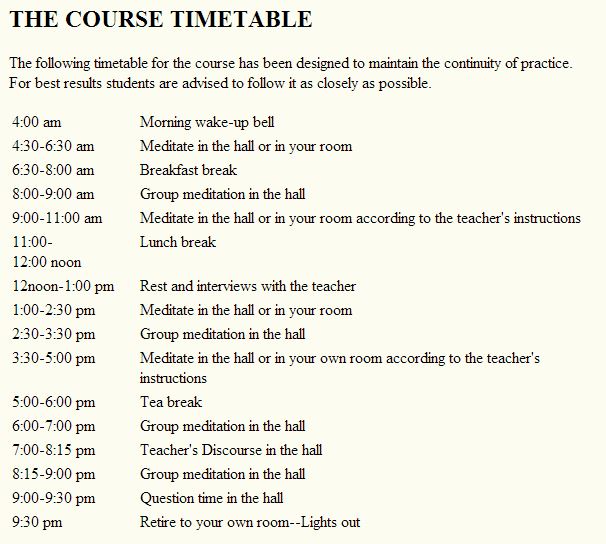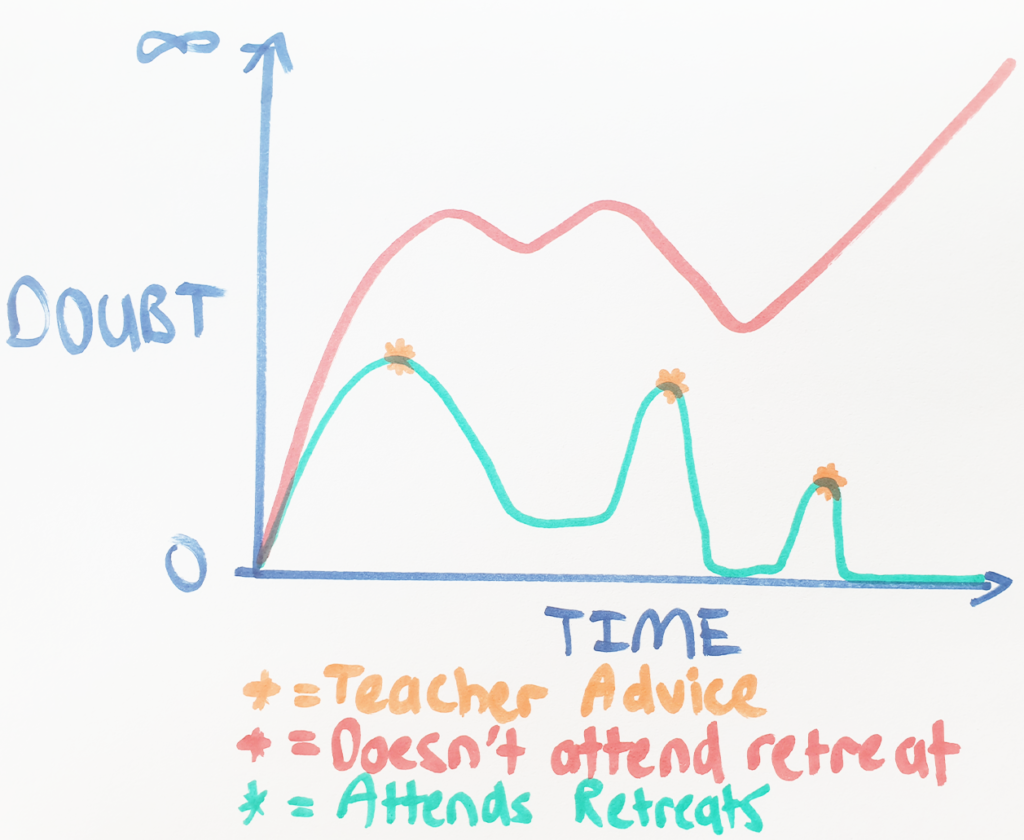Two years ago, I would watch a video that would plant the seed of Vipassana Meditation. The seed that would transform my life in profound ways.
Dealing with chronic generalised anxiety, uncertainty of where I was going and seeking mental clarity, I found myself scouring YouTube’s self-help scene.
Here, I stumbled across the video ‘The Most Common Practice of World-Class Performers’ by Tim Ferriss. Watch from 00:07 to 00:20.
What was the Common habit of World-Class Performers? Mindfulness Meditation.
Using the meditation apps Headspace and Waking Up, I was quickly hooked on the benefit of reduced anxiety. To name a few of the laughably huge list of medical benefits, I also likely experienced things such as improved memory, cognitive function and lowered cortisol.
After several months, it was now time to level up my practice. Heeding advice from the great Author and Neuroscientist Sam Harris, I plunged into my first 10 day Vipassana silent meditation retreat run by the late S. N. Goenka.
It was profound.
To give an example of one of the many recent sorts of benefits I’ve experienced, let me take you on a brief journey to an evening brimming with anxiety.
I recently took part in a Toastmasters Public Speaking group.
I had the not-so-pleasant experience of being situated in the middle of the room when the first speaking challenge of the night was presented:
Talk for 20 seconds about where you see yourself in 5 years
Being the 10th person to go I had what felt like a lifetime to ponder my encroaching doom. Getting closer and closer to me, I could feel my pulse increase.
My palms were sweating.
Anxiety skyrocketed to borderline panic attack levels.
There were two people to go before me.
Then one.
Blanketed with a debilitating level of anxiety, it was now it was my turn to speak where every part of me was telling me to skip my turn.
But it was here that like a lightning bolt of clarity struck.
My mindfulness training kicked in when I needed it most and I suddenly realized the emptiness of the fear. The irrational nature of its presence. The lack of utility it held in that moment.
I stood up, and I beamed with confidence.
I was able to speak clearly and articulate my thoughts with precision.
While the fear was still present, I was able to create enough space to become a witness to the dance of unpleasant sensations in the body without aversion to them.
According to most studies, people’s number one fear is public speaking. Number two is death – Jerry Seinfeld.
It would appear I had just overcome the number one fear largely thanks to my Mindfulness training.
Having many experiences alike, six months after my first retreat (In the context of this article when I say ‘retreat’ I’m referring to the S.N Goenka 10 day Vipassana meditation course) I sat my second course with a now committed daily 2 hour practice of Vipassana meditation.
As I now prepare myself to depart for my 3rd Vipassana Meditation retreat on September 24th 2020, what is it that makes these courses so special? Why, at 23, do I continue to pursue the spiritual path with such dedication?
Why do a Vipassana Meditation Retreat?
Retreats are the portal to a monastic lifestyle. Meditators begin by making a commitment to not killing, stealing, telling lies, taking intoxicants or partaking in sexual misconduct. The sexes are separated and clothing must be modest. There is no talking, reading, physical contact, exercise, and above all – no leaving the premise (within reason). Discipline is emphasized heavily, where students are encouraged to clock in 10 hours and 45 minutes of meditation daily.

The monastic lifestyle doesn’t f*** around. Read my detailed recount of my experience serving as a Male manager here.
This is a shock to our busy Western lifestyle, where a week alone can seem like a lifetime to take off; let alone having so many restrictions.
So why do it?!
We first need to understand some basic Buddhist psychology.
The entire Buddhist path may be categorized into three trainings that lead to profound inner peace when cultivated. These are Concentration, Wisdom and Morality.
To go into these three trainings in depth is beyond the scope of this article, but here’s the gist of it:
CONCENTRATION:
On retreat, the bulk of the progress comes from having ample opportunity to train the Concentration faculty. Through 10 hours and 45 minutes of meditation per day, students focus their attention toward the breath for the first three days. While sounding simple, very quickly one realizes this is one of the hardest things they’ve ever done. Unfortunately, without training, the brain is working against you. It is now well know that the Default Mode Network is largely responsible for regurgitating constant distractions that drive our attention away from the breath.
WISDOM:
After the first three days of training strictly on concentration, the mind may become still enough to begin having insights into our true nature. From this place of stillness, the technique of Vipassana is taught. Through their own direct experience, students gain the understanding of impermanence – that everything in their conscious experience is arising and rapidly passing away. Students learn that everything that they once thought as solid, permanent and who they thought to be ‘I’ is a constant flux of sensations arising entirely dependent on external circumstances. To deeply understand impermanence and dissatisfactoryness in this way is to understand the concept of no-self. That what we call self is a very well-constructed illusion that causes us tremendous suffering.
MORALITY:
Morality is sometimes neglected as a training in the pursuit of spiritual insights, however may be one of the most important. Basically, whatever we do in the ordinary world that we think will be of some benefit to others and ourselves is an aspect of working on this training. While this training has obvious positive societal and personal implications, it is also nourishing in training concentration and wisdom. Having an agitated mind does not help in strengthening the other faculties as concentration wanes.
It is these very trainings that lead to profound positive shifts in the way we perceive the world.
We develop mental balance and emotional intelligence (more on the importance of this later).
We see that the very emotions, thoughts and sensations we deemed to be the very bones of our being turn out to be no more than temporary, rapidly changing visitors.
Vibrations. that’s right, I said it. Vibrations!
As an old student, I relish the opportunity to continually develop these faculties to maturation. As I am participating in my upcoming retreat as a server (assisting meditators through their course via preparing food, doing laundry and cleaning), I will be training more so in the morality faculty than wisdom and concentration. However, even servers have the opportunity to meditate for 3 hours upward to 9 hours per day.
Read my detailed recount of my experience serving as a Male manager here.
Retreats also offer necessary guidance from teachers as we chart through the unfamiliar terrain of the still mind.
Not sure with how to progress skillfully? Having doubts about the practice? Paranoid about your entire conditioned reality largely being an illusion? Talk to a teacher.
This is especially useful for new but also returning students.

Being in the presence of teachers is also largely beneficial as often they often radiate what seek.
I recall on my second retreat feeling doubtful and frustrated about the practice. Seeking guidance, I went to see the assistant teacher running the course. Immediately upon sitting in his presence to ask my question, my disgruntled mind was quickly pacified to one of inner radiance.
There was an immediate transmutation of calm upon looking into my teachers’ eyes. This proceeded to provide me with tremendous inspiration for the remainder of the retreat and gave insight into what was attainable with committed practice. Many speak similarly about being in the presence of spiritual beings such as the Dalai Lama.
WHAT DO TEACHERS SAY ABOUT THE IMPORTANCE OF VIPASSANA MEDITATION RETREATS?
The general consensus from teachers is that retreats are a critical part to spiritual growth.
That is, if we seek awakening or heightened stages of consciousness.
It should be noted that even if we don't go on retreat there is incredible utility in basic teachings such as recognizing thoughts and emotions as not-self. These are the sorts of trainings found in Mindfulness-Based-Stress-Reduction (MBSR) practices that are becoming very popular.
As I alluded to earlier, Sam Harris was a large source of inspiration for getting me to go on my first Vipassana Meditation retreat. In his article ‘How to Meditate, Sam states:
In my experience, there is no substitute for doing extended periods of silent practice. - Sam Harris.
Sam Harris is not alone here. Teachers such as Joseph Goldstein whom has over 4 decades of experience teaching and practicing also attest to the necessity of going on retreat.
Retreat time is not a luxury. If we are genuinely and deeply committed to awakening, to freedom—to whatever words express the highest value you hold—a retreat is an essential part of the path. - Joseph Goldstein
While it may very well be possible to achieve heightened stages without retreat, we’re looking at a tail end of the bell curve distribution. At least, according to self-proclaimed arahant and author Daniel M Ingram.
Daniel states that in his experience he’s noticed very few meditators who reach stages of awakening without going on retreat. Watch from 22:00 to 22:30.
Daniel has also said that meditating upwards to 5-15 hours per day may be necessary for attaining liberating insights.
But it’s not just meditation teachers that assure us of the importance of going on retreat. Some of the best thinkers in the world are avid meditators.
Author of international best selling books Sapiens and 21 lessons for the 21st Century Yuval Noah Harari attests his ability to think clearly to the benefits of practicing Vipassana Meditation daily for 2 hours and going on annual 30-60 day retreats.
Yuval also emphasizes the critical importance of developing mental balance and emotional intelligence for the future. He has dubbed these skills (yes, they are skills) the most important investments one can make for our rapidly changing world. It seems meditation can reliably produce this outcome. Watch from 02:50 to 03:30
THE BOTTOM LINE:
With all that being said, the bottom line is this.
Without regularly attending a retreat setting it is highly unlikely that we will develop sufficiently in the three faculties of wisdom, concentration and morality that produce insights that liberate us from suffering.
This is apparent as some of the best teachers in the field see retreat as necessary to progress with any seriousness along the spiritual path.
Some of best thinkers I look up to deem emotional intelligence and mental stability of vital importance if we are to have any hope in the future.
Meditation is a powerful vehicle to attain this.
Nonetheless, an open mind is important to maintain and I endeavor to do this as I continue to explore my conscious experience.
Best Wishes,
Sam.
Recommended reads to strengthen practice:
- The Mind Illuminated
- Mastering the Core Teachings of the Buddha
- Waking Up: A Guide to Spirituality Without Religion
- The Art of Living: Vipassana Meditation as Taught by S.N Goenka
- The Untethered Soul: The Journey Beyond Yourself
Watch my Full Video on this topic:





